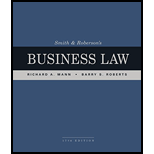
Case summary:
Person J suffered personal injuries with a tire manufactured by Company U. His father purchased the automobile from a dealer in State I. The tire was sold in Country B to Company G and subsequently installed on Company O when it was assembled in Company G plant in Country B.
Company O delivered automobiles to State I during those years ranging from 3,235 to 6,630. Person C brought suit in State I against Company U to recover for damages for his personal injuries. Company U declared that, the case was not subjected to jurisdiction of State I courts because the company was not registered to do business in that state and it never had an agent and it never sold or shipped products into State I.
To discuss: The arguments Company U could make for support of its claim that State I courts do not have the jurisdiction over it.
Want to see the full answer?
Check out a sample textbook solution
Chapter 3 Solutions
Smith and Roberson’s Business Law
- What is the significance of a proxy statement in corporate law?arrow_forward1. Basic Research LLC advertised its products on television networks owned by Rainbow Media Holdings Inc through an ad agency Icebox Advertising Inc. As Basic’s agent Icebox had express authority to buy ads from Rainbow on Basics behalf, but the authority was limited to buying ad with cash in advance. Despite this limit Rainbow sold ads to Basic through Icebox on credit. Basic paid Icebox for the ads, but Icebox did not pass all of the payments on to Rainbow. Icebox filed for bankruptcy. Can Rainbow recoup the unpaid amounts from Basic? Explain.2. Western Fire truck Inc contracted with Emergency One Inc (EO) to be its exclusive dealer in Wyoming and Colorado through Dec. 2003. James Costello, a Western Salesperson, was authorized to order EO vehicles for hi customers. Without informing Western, Costello emailed EO about Westerns diffuclties obtaining cash to fund its operations. He asked about the viability of Westerns contract and his possible employment with EO. On EO’s…arrow_forwardWhy would a business support allowing a transfer of rights or duties to third parties?.arrow_forward
- When OTES developed its first online application for university math courses, BD sued both OES and Gone. BD contends that Gone has breached his covenant not to compete, because he is engaging in a competitive business in online learning resources in university-level math and science and that he has proprietary information regarding the development of science and math tutorial programs. BD further contends that OTES is engaging in tortious interference with contract. BD is Gone and OTES deny the claims, and state that Gone has not violated his employment agreement, because they are not engaging in a competitive business with BD. The law in Georgia was recently amended to include the following provisions: A covenant not to compete must be reasonable in terms of time, geographical area, and prohibited activities. A time period longer than 2 years is presumed to be unenforceable. The courts are permitted to blue-pencil (or reform) covenants that are otherwise unenforceable.…arrow_forwardExplain the three legal forms a business could take and state one advantage and one disadvantage of each.arrow_forward
 Understanding BusinessManagementISBN:9781259929434Author:William NickelsPublisher:McGraw-Hill Education
Understanding BusinessManagementISBN:9781259929434Author:William NickelsPublisher:McGraw-Hill Education Management (14th Edition)ManagementISBN:9780134527604Author:Stephen P. Robbins, Mary A. CoulterPublisher:PEARSON
Management (14th Edition)ManagementISBN:9780134527604Author:Stephen P. Robbins, Mary A. CoulterPublisher:PEARSON Spreadsheet Modeling & Decision Analysis: A Pract...ManagementISBN:9781305947412Author:Cliff RagsdalePublisher:Cengage Learning
Spreadsheet Modeling & Decision Analysis: A Pract...ManagementISBN:9781305947412Author:Cliff RagsdalePublisher:Cengage Learning Management Information Systems: Managing The Digi...ManagementISBN:9780135191798Author:Kenneth C. Laudon, Jane P. LaudonPublisher:PEARSON
Management Information Systems: Managing The Digi...ManagementISBN:9780135191798Author:Kenneth C. Laudon, Jane P. LaudonPublisher:PEARSON Business Essentials (12th Edition) (What's New in...ManagementISBN:9780134728391Author:Ronald J. Ebert, Ricky W. GriffinPublisher:PEARSON
Business Essentials (12th Edition) (What's New in...ManagementISBN:9780134728391Author:Ronald J. Ebert, Ricky W. GriffinPublisher:PEARSON Fundamentals of Management (10th Edition)ManagementISBN:9780134237473Author:Stephen P. Robbins, Mary A. Coulter, David A. De CenzoPublisher:PEARSON
Fundamentals of Management (10th Edition)ManagementISBN:9780134237473Author:Stephen P. Robbins, Mary A. Coulter, David A. De CenzoPublisher:PEARSON





